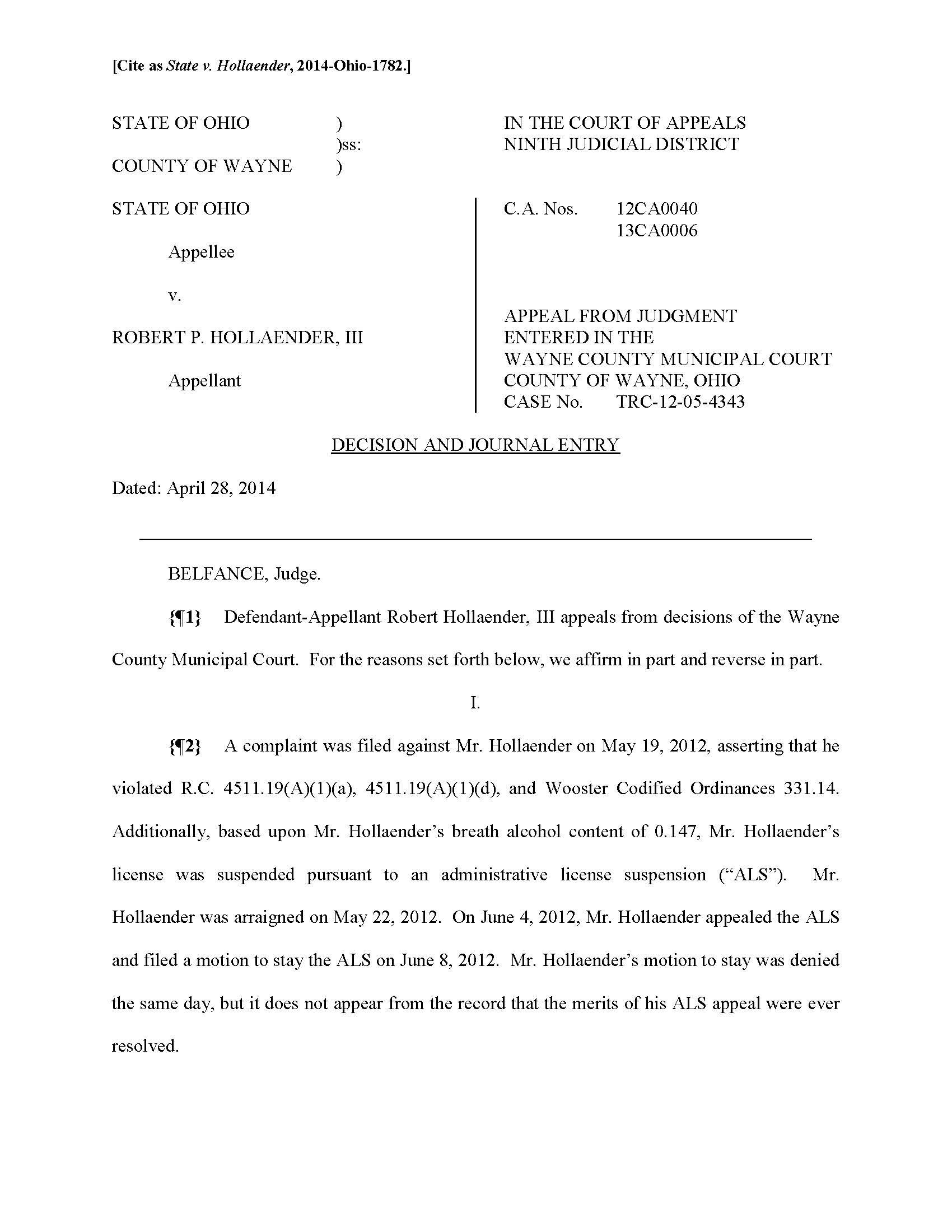 In Ohio DUI/OVI cases, calculating speedy trial time can be complex. As a general rule, the trial must be held within 90 days of the arrest or summons. There are, however, many exceptions to this general rule. When one of the exceptions occurs, time is “tolled” (that time does not count toward the 90-day limit). One exception occurs when the defendant files a motion for discovery, and another exception occurs when the defendant files a motion to suppress evidence. A recent decision by an Ohio Court of Appeals addresses the application of speedy trial laws to Ohio DUI/OVI cases.
In Ohio DUI/OVI cases, calculating speedy trial time can be complex. As a general rule, the trial must be held within 90 days of the arrest or summons. There are, however, many exceptions to this general rule. When one of the exceptions occurs, time is “tolled” (that time does not count toward the 90-day limit). One exception occurs when the defendant files a motion for discovery, and another exception occurs when the defendant files a motion to suppress evidence. A recent decision by an Ohio Court of Appeals addresses the application of speedy trial laws to Ohio DUI/OVI cases.
Articles Posted in DUI/OVI lawyering
Supreme Court Clarifies Requirements For Motions To Suppress In Ohio DUI/OV Cases
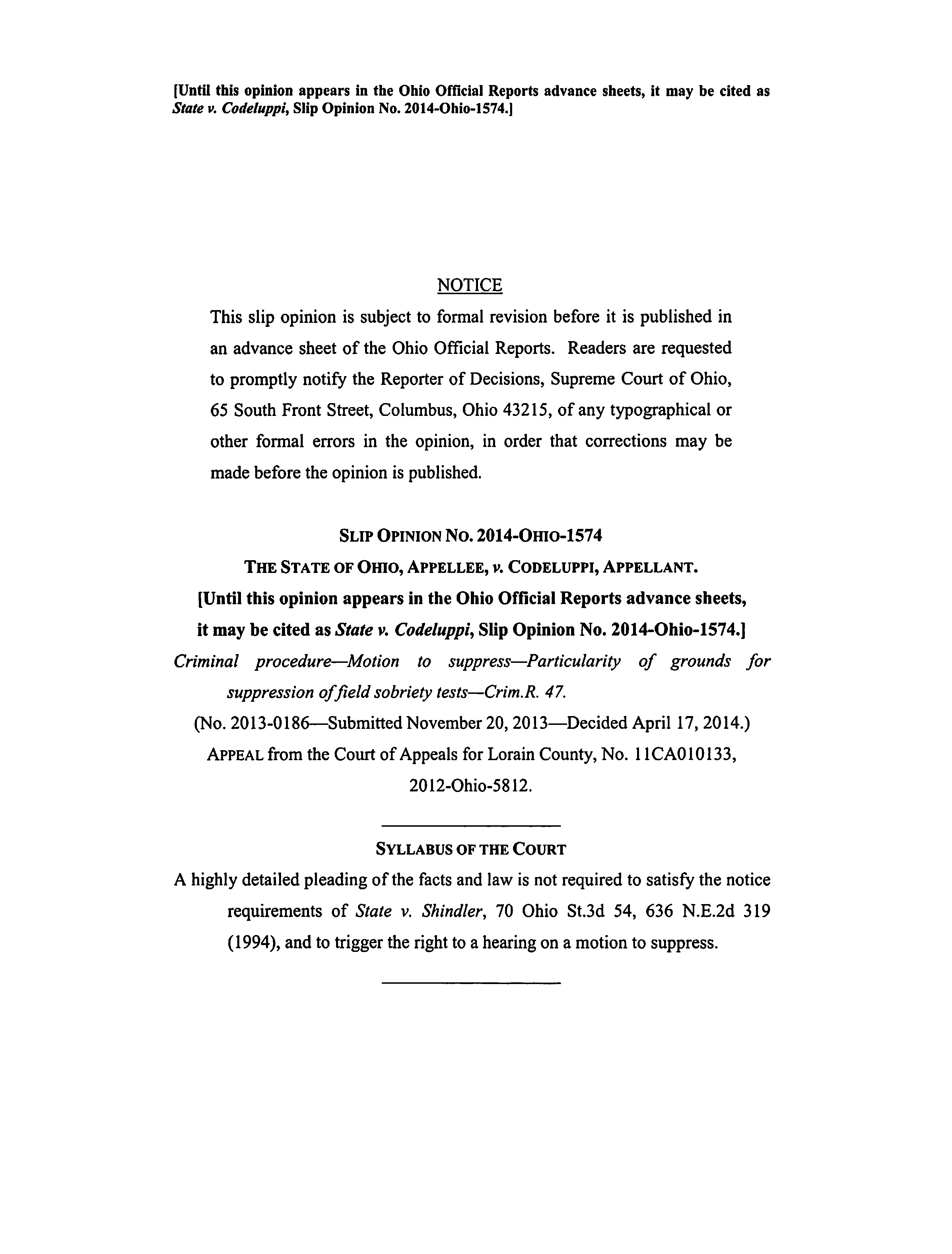 Two days ago, the Ohio Supreme Court issued a decision clarifying how specific a motion to suppress must be for the defendant to receive an evidentiary hearing on the motion. In State v. Codeluppi (2014), the Court concluded: “[A] highly detailed pleading of the facts and law is not required to satisfy the Shindler notice requirements and to trigger the right to a hearing on the motion to suppress.” This conclusion affirmed the Court’s decision from a decade ago in State v. Shindler (1994). The Codeluppi decision hopefully will end uncertainty about the specificity required for motions to suppress in Ohio DUI/OVI cases.
Two days ago, the Ohio Supreme Court issued a decision clarifying how specific a motion to suppress must be for the defendant to receive an evidentiary hearing on the motion. In State v. Codeluppi (2014), the Court concluded: “[A] highly detailed pleading of the facts and law is not required to satisfy the Shindler notice requirements and to trigger the right to a hearing on the motion to suppress.” This conclusion affirmed the Court’s decision from a decade ago in State v. Shindler (1994). The Codeluppi decision hopefully will end uncertainty about the specificity required for motions to suppress in Ohio DUI/OVI cases.
DUI / OVI In Ohio Juvenile Courts
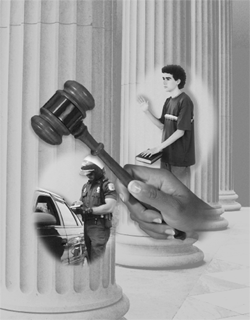
I recently represented a client for a DUI / OVI in a juvenile court near Columbus, Ohio. The case went to trial, and I was sharing my experience with a colleague. The colleague happened to be coordinating a DUI / OVI seminar for the Columbus Bar Association, and he asked me to speak at the seminar on the topic of handling DUI / OVI cases in juvenile court. The topic is a good one because most attorneys do not regularly represent clients for DUI / OVI in juvenile court, and there are some differences between juvenile cases and adult cases.
State v. Lancaster May Change Interpretation Of Ohio Breath Testing Law
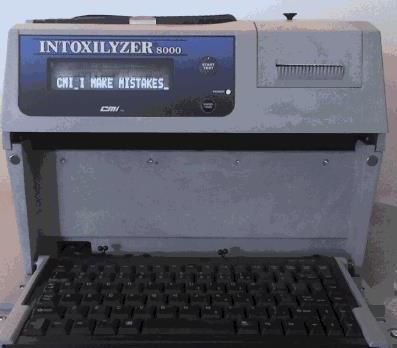 Intoxilyzer 8000 Declared Unreliable In Ohio DUI/OVI Case
Intoxilyzer 8000 Declared Unreliable In Ohio DUI/OVI Case
This blog has discussed Intoxilyzer 8000 litigation in many previous posts. One of those posts (November 18, 2012) mentioned the case of State v. Lancaster in the Marietta Municipal Court. I was asked to help with that litigation as counsel for Lancaster. Like many of the I-8000 cases throughout Ohio, the Lancaster case involves the reliability of the I-8000. Unlike most of the other cases, however, the Lancaster case includes testimony of expert witnesses for the prosecution and defense. After five days of testimony, the verdict is in, and the breath test is out! The decision has already been appealed and is staged to possibly change the interpretation of breath-testing law in Ohio.
Ohio Supreme Court Clarifies Discovery Obligations In DUI/OVI Cases
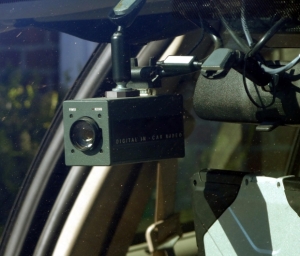 For the second time in two months, the Ohio Supreme Court decided a case interpreting the discovery rules that apply to Ohio DUI/OVI cases and criminal cases. A previous post in this blog discussed ‘recent’ changes to the rules for discovery, the exchange of evidence between the prosecution and defense. In March of 2013, the Ohio Supreme Court decided the case of State v. Darmond and addressed how sanctions are to be imposed for violations of the discovery rules. In May of 2013, the Court issued a decision addressing when the obligation of providing discovery is triggered for the defense.
For the second time in two months, the Ohio Supreme Court decided a case interpreting the discovery rules that apply to Ohio DUI/OVI cases and criminal cases. A previous post in this blog discussed ‘recent’ changes to the rules for discovery, the exchange of evidence between the prosecution and defense. In March of 2013, the Ohio Supreme Court decided the case of State v. Darmond and addressed how sanctions are to be imposed for violations of the discovery rules. In May of 2013, the Court issued a decision addressing when the obligation of providing discovery is triggered for the defense.
Ohio Appellate Court Affirms Conviction In D.U.I./O.V.I. Case Involving Prescription Drugs

William Strebler was lucky and unlucky. When he drove his car between two parked trucks, nobody was killed or injured. That’s pretty lucky. After he was found guilty of driving under the influence of his prescribed pain medicine, his conviction was affirmed by the court of appeals, and he had to serve two years in prison. That’s not-so-lucky. His case illustrates the importance of trial strategy in Ohio D.U.I./O.V.I. defense and also demonstrates the difficulty of enforcing D.U.I./O.V.I. laws when the substance in question is a prescription medication.
Should Ohio Have Immediate Trials For O.V.I./D.U.I?
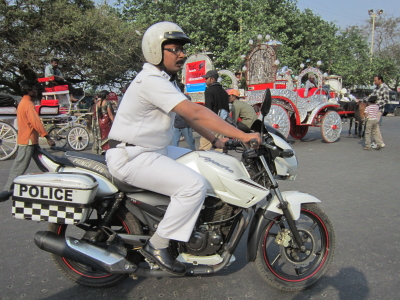
There is little tolerance for drunk driving in Mumbai, India. Like Ohio, the penalty for a first D.U.I. offense in India is up to six months in jail. Unlike Ohio, the legal limit for blood alcohol content in India is .03 (Ohio’s is .08), and there is no plea bargaining. In the month of March, Mumbai traffic police charged 3,727 people with D.U.I. The traffic police recently requested the creation of mobile courts, according to an article in The Times Of India. If the request is granted, magistrates will hear D.U.I. cases at those mobile courts, and the trial will take place immediately.
The Under-Rated Lawyering Skill For Ohio DUI/OVI Cases
Plea bargaining is an under-rated lawyering skill. Each Law And Order episode has about one minute of plea negotiations and 20 minutes of trial. That show would have us believe every case goes to trial. The reality is that fewer than five percent of criminal cases go to trial. The other 95 percent or more are resolved with plea agreements. Negotiating plea agreements may not be the sexy substance of television and movies, but it’s an important skill for criminal defense attorneys.
Location, Location, Location
I’m moving my office to a new location. Beginning in October of 2011, my office is located in suite 450 of the Mettler Toledo building at 1900 Polaris Parkway in Columbus, Ohio. The building is pretty hard to miss: it’s a six-story office building at the intersection of Interstate 71 and Polaris Parkway (just north of I-270) and says “Mettler Toledo” in huge letters that can be seen from I-71 (and almost from I-270!).
Should I Take The Breath Test In An Ohio OVI Case?
As a D.U.I. defense attorney, this is one of the most frequently asked questions I receive (second only to “how can you do that?”). The answer is surprisingly complicated: it depends on factors that include how much alcohol you drank, whether you are more concerned about the short-term or long-term status of your driver’s license, whether you have prior convictions, whether you’re on probation, and whether you have a commercial driver’s license.
 Columbus OVI/DUI Attorney Blog
Columbus OVI/DUI Attorney Blog

